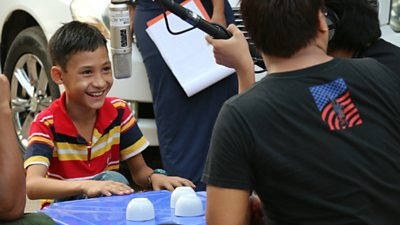Downloads
����ý Media Action’s Tea Cup Diaries promotes understanding, openness and respect for people from different ethnic and religious backgrounds in Myanmar. Listeners reported improved knowledge of other ethnic and religious groups, and had a better understanding of how to resolve conflicts.
Publication date: December 2015
The project
����ý Media Action launched in Myanmar in May 2015, with funding from USAID’s Office of Transition Initiatives. The 15-minute, 26-part drama airs on state broadcaster Myanmar Radio on Friday evenings, with repeats on Saturday mornings. Set in a tea shop on the outskirts of Yangon, Tea Cup Diaries includes characters from different backgrounds, providing positive and realistic portrayals of minority groups living and working alongside characters from the majority Bamar Buddhist community. A total of 25 rural and urban listener groups were also set up to deepen engagement with the show and promote discussion of social cohesion issues. Listener group members represent various ethnic and religious groups and reflect a national audience.
Research approach
A qualitative evaluation was conducted in September and October 2015, towards the end of the first series. It aimed to understand audience engagement with the drama, and capture self-reported learning.
Interviews were conducted with regular listeners in Yangon, Pakokku and Pekon. These Buddhist majority locations were chosen to explore how audience interpretations differed based on their exposure to other groups. Due to the challenge of recruiting regular home listeners, the majority of participants were members of listener groups.
Key findings
Strong listener engagement
- The programmestands out as an authentic and realistic portrayal of Myanmar life. It particularly resonates with women and in rural areas.
New understanding of others
- Listeners reported learning new things about personal communication, ethnic and religious diversity, and gender roles. Rural listeners, who have limited exposure to other communities, gained the most insight.
- Listeners said they learnt how to better resolve differences, by emulating qualities of the characters they admire, who use effective ways of addressing disagreements between family, friends and colleagues.
- Audiences came to understand other ethnic lives (particularly Shan) and other religious practices. Christian characters were interesting to many listeners, countering their previous perceptions of the religion.
Religion still a barrier to cohesion
- Perceived differences between religions remained strong, and deep seated tensions between religious groups is the most difficult barrier to address. There was particularly strong feeling against Muslims and inter-religious marriage, which listeners did not welcome in the programme.
Discussion is important for learning
- Listener groups are key to translating listening into learning. While regular home listeners tend to talk about storylines and characters, listener group discussions help guide participants to talk about social cohesion themes featured in the drama.
Project context
Longstanding ethnic conflicts are ongoing and there is significant religious tension in Myanmar. In October 2015 ceasefire agreements were signed by the government with eight ethnic armed groups but seven other groups refused to sign. Conflict in Kachin and Shan is ongoing.
Religious fundamentalism led by some Buddhist monks features prominently in media and public; discourse, with overt efforts to stoke anti-Muslim sentiment. Muslims were excluded from running as political candidates in the 2015 elections.
In addition, religious separatism was promoted with new laws such as the inter-faith marriage bill passed in August 2015, which penalises inter-religious couples.
Formative research prior to production revealed that people have limited and superficial interactions with those from different ethnic or religious backgrounds. Religion is perceived to be a greater barrier to social inclusion than ethnicity, and while most people would accept marriage between ethnicities with the same religion, they commonly reject inter-religious marriage
Implications and impact
audiences came to know characters’ personalities, rather than defining them only by religion or ethnicity. The series helped normalise diversity and illustrated how people with different backgrounds can live and work alongside each other.
The programme demonstrated that listeners in Myanmar are open to learning about others, but tensions remain in storylines addressing religious divisions. Challenging fundamental and deeply entrenched beliefs about religion is difficult, given the wealth of other sources emphasising the need for religious separation.
Listener groups created a safe space for discussion, encouraging listeners to talk about diversity and learn from each other.
